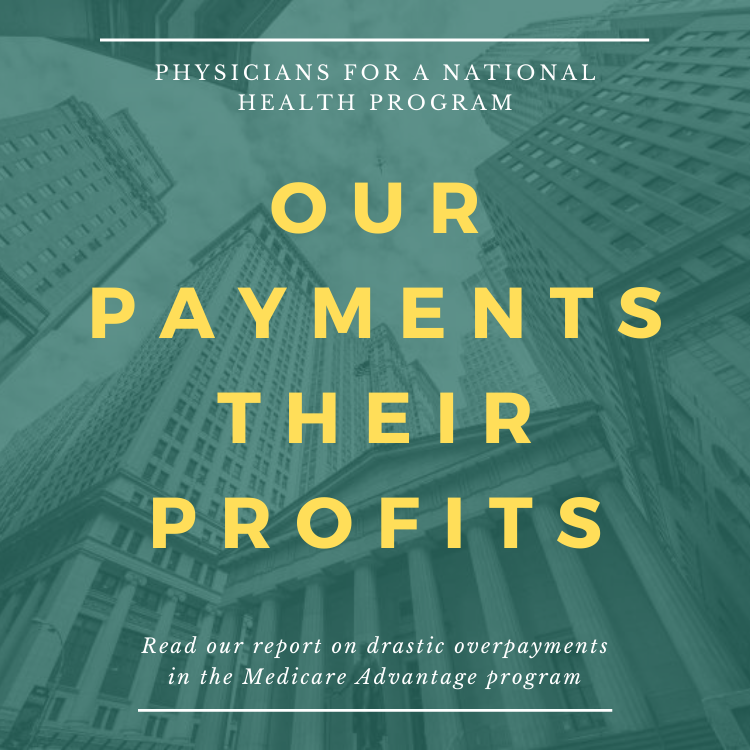By Adam Gaffney, M.D.
The Guardian, March 7, 2018
A wildcat teachers’ strike that roiled West Virginia for nine long days ended on Tuesday, after the state government passed a 5% pay hike. For a state that doesn’t even allow state employees to engage in collective bargaining, this amounts to a historic victory. Yet much remains undone.
The strike was largely about healthcare benefits, which the deal mostly skirted. Even worse, the educators’ hard-won raise could come at the expense of other important state programs – potentially Medicaid, although this remains uncertain. Such an outcome only reaffirms a lesson made explicit throughout labor history: universal healthcare programs, rather than private benefits won through collective bargaining, must be a priority for organized labor.
Between rising healthcare costs on one hand and public austerity on the other, West Virginia’s teachers’ health insurance plans had grown gradually worse in recent years, reflecting the situation throughout much of the country. As one teacher told the Los Angeles Times, pay was “not what kept us out. It’s the insurance. That’s the big deal.”
A glance at the 64-page “Shopper’s Guide” teachers were forced to navigate illustrates just how hellish their options had become: in addition to rising monthly premiums, plan holders faced onerous deductibles, copays, and coinsurance for everything from prescription drugs to childbirth.
Most notoriously, they also faced coerced use of a patronizing app called Go365, a so-called “workplace wellness program.” “They implemented Go365,” one teacher told the New York Times “which is an app that I’m supposed to download on my phone, to track my steps, to earn points through this app. If I don’t earn enough points, and if I choose not to use the app, then I’m penalized…”
Such programs are being pushed on to workers everywhere. They were encouraged by the Affordable Care Act despite paltry evidence that they save money, much less improve health (although they may serve to push costs on to sicker workers). Workers, meanwhile, understandably find reporting their personal health information to their boss (much less being penalized for their cholesterol or BMI) paternalistic and Orwellian.
Go365 caused an uproar, and its penalties were dropped in January, while premium and deductible hikes have been deferred for now. However, the strike deal otherwise left healthcare untouched, apart from creating a taskforce to find solutions for the problem of rising costs. We can assume that its proposed solutions will be insufficient, at least in the long run: as long as health coverage remains a privatized benefit and not a public good, American workers’ healthcare will periodically return to the chopping block.
This is evident from Appalachia’s own long history of strikes over healthcare. In 1946, a strike by the United Mine Workers (UMW) ended with a famous agreement that brought its members comprehensive healthcare, paid for by a tax on coal.
The striking teachers have drawn inspiration from these “mine wars,” even brandishing the red bandannas said to have been worn by rifle-toting coalminers during the 1921 Battle of Blair Mountain, which pitched them against a powerful private militia in an epic gunfight over union rights.
Yet the teachers’ strike is connected to that bloody history in a more complex sense as well. As labor historian Alan Derickson has written, the UMW’s 1946 historic healthcare victory “gave other unions hope for gains in health benefits through collective bargaining,” but it also took the UMW away from the national health insurance cause.
Other big unions followed, such that by the late 50s, labor “had abandoned the goal of protection for the entire population.” The teachers’ inadequate healthcare coverage today, in other words, is in part the consequence of labor’s turn away from universal healthcare in history.
Unions, of course, must win benefits and protections for their workers in the short term. But the teachers – and organized labor as a whole – will have to go beyond what the miners long ago accomplished to make the rights of all workers secure, for a privatized welfare state cannot take the place of a public program of universal healthcare. That struggle remains ahead.
Dr. Adam Gaffney is an instructor in medicine at Harvard Medical School and a pulmonary and critical care doctor at the Cambridge Health Alliance. He is secretary and president-elect of the advocacy organization Physicians for a National Health Program.
